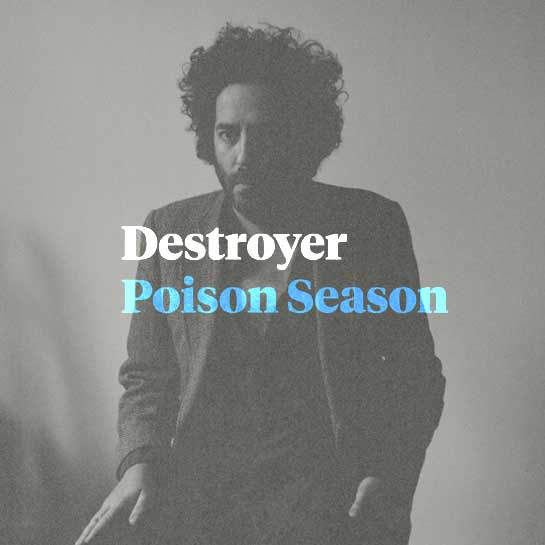Album Review: Destroyer’s ‘Poison Season’

On Poison Season, Destroyer’s tenth album in just under two decades, frontman Dan Bejar proves he’s still overflowing with ingenuity. As a band, Destroyer have gone through a multitude of sonic changes, from their beginning as an off-kilter singer-songwriter project (City of Daughters), to their mid-period as the world’s ultimate literary glam-rock band (Streethawk: A Seduction), to the late-career shift to 80s disco revivalists (Kaputt.) After finding unexpected success with the latter album, Bejar took four years off to figure out how to craft his next masterpiece. In a way, Poison Season feels like the album he’s always wanted to produce, but hasn’t had the budget or creative freedom to until now. The album is full of odd moments both lyrically and musically, and although Bejar’s voice on this outing is comparatively tame, the instrumentation here is wilder than ever before.
For one stylistic reason or another, the electronic synths and drum machines that dominated Kaputt have been replaced with live strings. An orchestra appears on almost all the songs, and is surprisingly complementary to the usual guitars and saxophones that have become integral to the Destroyer sound. The opening song, one of three that uses the same set of lyrics, “Times Square, Poison Season I”, features nothing but an orchestra and a brief wandering synth that expulses the last bit of Kaputt from the band’s system. It’s an incongruously mellow moment, one that ends with a haunting, trailing piano. What follows is the lead single “Dream Lover”, a rocking pop tune that finds the band at the opposite end of the musical spectrum. It’s a track deliriously crowded with saxophones, guitars, and drums that battle with Bejar’s vocals for center stage.
In one word, Poison Season is theatrical, a characteristic only hinted at on previous releases. The combination of grandiosity and bookish songwriting makes listening to the album an experience akin to watching a play consisting only of the main character’s inner monologue. Bejar describes his characters so vividly that it should make playwrights jealous, and his skills as a composer make one wonder why he hasn’t appeared on more soundtracks. Like every Destroyer record, Poison Season is full of names and locations that provide a setting for his elaborate stories. The only real lyrical change time around is that he’s smartly eliminated the wordless choruses that previously adorned the majority of his work.
At the center of this album is the original, orchestra-barren version of “Times Square”, one of Destroyer’s most playful songs to date. It features a jauntily strummed acoustic guitar over some catchy riffs, and features an actual chorus. As a bonafide pop tune, the track goes against Bejar’s statement that this release would mark the beginning of a distinctly anti-pop direction. The rest of the music, however, delivers on this promise.
“Dream Lover” and “Times Square” excepted, the tracks here lack choruses and definitive structures. But while the arrangements have loosened, the instrumentation has become more calculated. Some instruments only make a single appearance, seemingly for the sole purpose of highlighting specific lyrics and emotions. Halfway through “Hell”, the guitars take a break, and a fluttery string section highlights the phrase “an angel flies by.” Another curiosity is the addition of bongos, which make several appearances throughout. In theory they should sound cheesy, but as was proved on Kaputt, even the cheesiest of instruments can be played with sincerity.
A few songs like “Girl In a Sling” and “Solace’s Bride” are unabashedly pretty, a first for a band which previously revolved around the ugliness of words. This shift in sound has to do largely with the vocals, which are presented in a much softer manner. One of the most memorable vocal moments on the album occurs near the end of the lovely penultimate track, “Sun In the Sky.” The sound builds wildly; drums crash and the guitar is played frenetically. Then suddenly it all stops and Bejar delivers the line “I’m so much deeper than the damage” with an uncharacteristic earnestness. My only gripe is that the album doesn’t end right here. Instead, the song continues for a bit longer, and the album closes with the third version of “Times Square, Poison Season II.” The final track ties the album together, but seems unnecessary, causing the album to fizzle out rather than end with a bang.
The complete redirection the band has taken shows that they’re still full of surprises, and it’ll be interesting to see what musical territory Bejar chooses to explore next.
